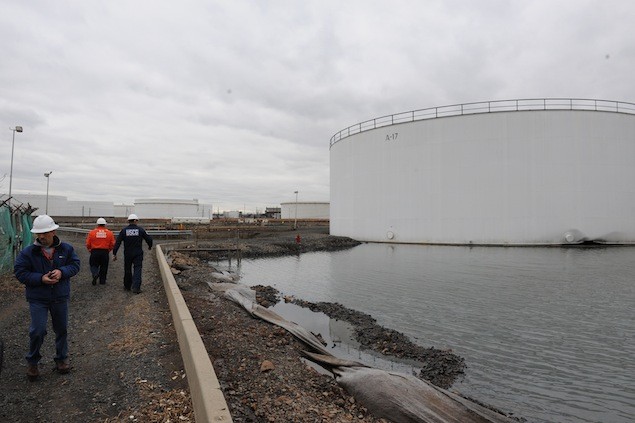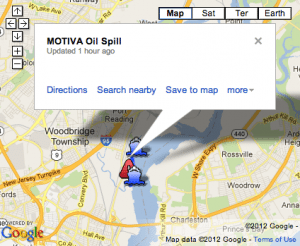Barge Collision Spills Oil Into Lower Mississippi River
The U.S. Coast Guard responded Saturday to a report of an oil spill in the lower Mississippi River after two vessels collided near Bacherie, Louisiana.

U.S. Coast Guard response technicians, from the Atlantic Strike Team, coordinate with a Motiva representative to determine environmental impact, cleanup effectiveness, resource availability and ensure spills are contained and cleaned after Hurricane Sandy destroyed areas near Linden, N.J., Oct. 31, 2012. Photo: USCG

(Bloomberg) — Workers contained a spill of diesel fuel caused by superstorm Sandy, blocking it from flowing into a waterway that separates New Jersey and New York, the U.S. Coast Guard said.
Erik Swanson, an agency spokesman based in New York, said four storage tanks at a facility operated by Motiva Enterprises LLC were damaged by the storm. Motiva is a joint venture of Royal Dutch Shell Plc and Saudi Refining Inc.
Two of the tanks, which each hold as much as 336,000 gallons of fuel, leaked diesel into a creek that feeds Arthur Kill, Swanson said.
“The exact volume released is yet to be determined,” Swanson said.
The leak has stopped, he said. Larry Ragonese, press director for the New Jersey Department of Environmental Protection, said earlier today that about 336,000 gallons of fuel had leaked from a single damaged storage tank.
About 130 workers were helping in the clean-up, Swanson said. Testing by the Coast Guard hasn’t indicated any air- quality issues at the spill site, Swanson said.
Ragonese said about about 30 birds were found with fuel on them. Swanson said he couldn’t confirm any effects on wildlife.
Separately, a storage tank at a Kinder Morgan Inc. terminal in Carteret, New Jersey, on the Arthur Kill leaked about 10,000 gallons of biodiesel, Ragonese said. It wasn’t clear how much of the fuel got into the water, he said.
“We did have a tank that knocked into another tank, which caused a tear,” said Joe Hollier, a spokesman for Kinder Morgan. “The product is contained.”
-By Jim Snyder. Copyright 2012 Bloomberg.

Sign up for gCaptain’s newsletter and never miss an update

Subscribe to gCaptain Daily and stay informed with the latest global maritime and offshore news
Essential news coupled with the finest maritime content sourced from across the globe.
Sign Up